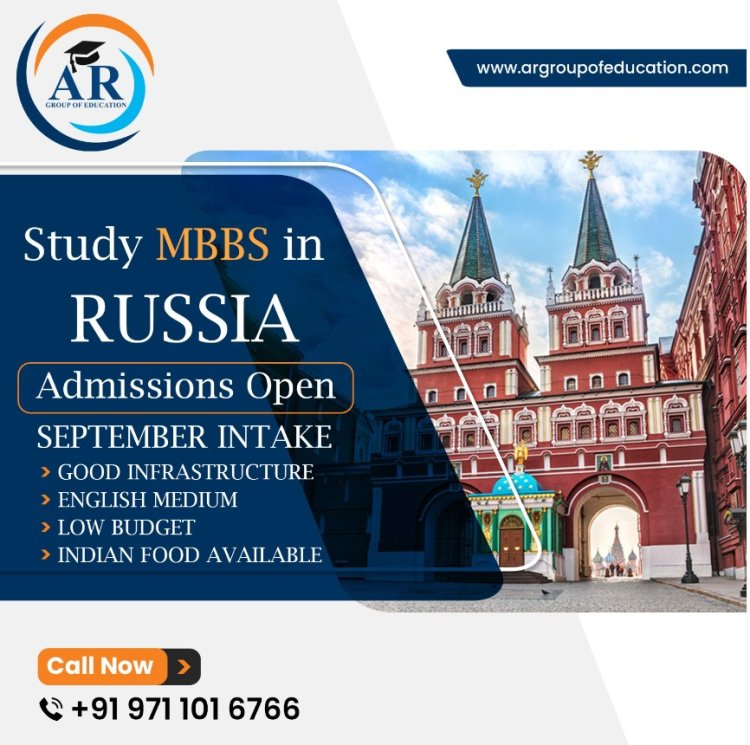A Comprehensive Guide to MBBS Fees in Russia: Key Considerations and Costs.
Pursuing MBBS in Russia covering tuition fees, living expenses, accommodation and extras. Get an overview of payment plans, language courses and practical considerations to make an informed decision about studying medicine in Russia.
Share this Post to earn Money ( Upto ₹100 per 1000 Views )

Introduction:
MBBS (Bachelor of Medicine, Bachelor of Surgery) fees in Russia may vary by university and city. It is important to note that fees are subject to change, so it is recommended to check with the specific university for up-to-date information. Here are some general points to note about MBBS fees in Russia.
Tuition:
Tuition for MBBS programs in Russia is often lower compared to many Western countries.
Fees can range from approximately $3,000 to $8,000 per year depending on the university.
Cost of Living:
The cost of living varies from city to city, and large cities tend to be more expensive than smaller ones.
On average, students have to spend about $300-$600 per month for housing, food, transportation and other living expenses.
Program Duration:
MBBS programs in Russia usually last six years, including theoretical and practical training.
Additional costs:
In addition to tuition and housing costs, students may also consider other costs such as health insurance, visa fees and study materials.
Scholarships and Financial Aid:
Some Russian universities may offer scholarships or financial support to international students. You should ask about these options during the application process.
Exchange rates:
Remember that exchange rates can affect the total cost of studying abroad. You must be aware of exchange rate fluctuations.
Accreditation and Recognition:
Before joining the university, make sure that it is recognized by the Medical Council of India (MCI) or the relevant medical authorities in your country.
Language of instruction:
Most MBBS programs in Russia are conducted in English, but you must confirm the language of instruction and assess your language skills.
Visa Rules:
Understand the visa rules and requirements for studying in Russia. This includes getting a student visa and complying with the rules on working part-time while studying..
Hostels:
Many Russian universities offer on-campus hostels for foreign students. As a rule, the price of hostel accommodation is lower compared to a private rental.
Payment plans:
Some universities may offer flexible payment plans that allow students to pay in installments instead of cash. Ask about available payment options if you are considering college.
Clinical Rotations:
MBBS programs in Russia often include clinical rotations in affiliated hospitals. Some universities may charge additional fees for these practical internship experiences, so it is important to consider such costs.
Extracurricular activities:
Consider additional expenses for extracurricular activities, social events and cultural experiences. Participating in these activities can enrich your overall college experience.
Health insurance:
Health insurance is mandatory for foreign students in Russia. Check the special insurances approved by the university and related expenses in the budget.
Language courses:
If the university you choose requires a language proficiency test and you do not meet the requirements, you may need to take language proficiency courses. These courses may have a separate fee.
Travel costs:
Factor in the cost of traveling to and from Russia, as well as any trips back home during vacations. Keep an eye on flight prices and plan your travel budget accordingly.
Exchange rate fluctuations:
Exchange rates can affect the total cost of education. It is recommended to monitor currency trends and plan your finances accordingly.
Employment Opportunities:
Some students may consider part-time job opportunities to supplement their income. However, it is important to understand local regulations and restrictions on the employment of international students.
Graduation fees:
Check if there are additional costs associated with graduation, such as gown rental, certificate issuance or ceremony fees.
Financial Planning:
Develop a comprehensive financial plan that takes into account all aspects of your education, including unexpected expenses. This will help you manage your budget effectively while in Russia.
Conclusion:
Always contact the University's International Admissions Office and are interested in receiving the most accurate and up-to-date information on MBBS fees and related costs. In addition, it is worth asking for advice from current foreign students or alumni who have personal experience of Studying in Russia.














